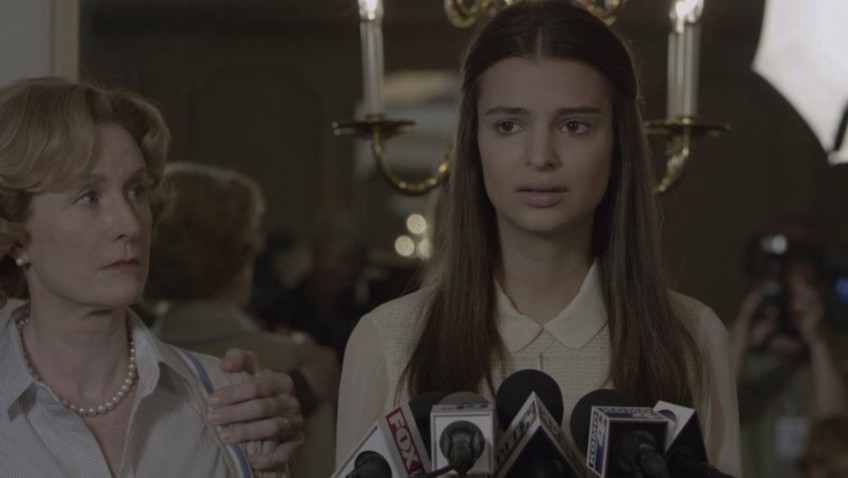Gone Girl is the cinema adaptation of Gillian Flynn’s best-selling novel, directed by David Fincher from a script by Flynn. Fincher is best known for his two great films: Zodiac and The Social Network. But the other side of Fincher is his adaptations of novels with ‘Girl’ in the title. His adaptation of The Girl with the Dragon Tattoo turned the film’s major asset, Rooney Mara, into a star. With Gone Girl, Fincher fares less well, not only because the eponymous Girl is a disappointment, but because the film sometimes feels like a plodding book adaptation.
Gone Girl is the story of bubbly Amy (Rosamund Pike) a quiz writer, and Nick Dunne (Ben Affleck), a journalist working in Manhattan, who meet and fall in love. They enjoy a short period of marital bliss in a beautiful town house purchased with the proceeds from the Amazing Amy books, written by her parents as Amy was growing up. All that changes when Nick, who has lost his job and takes it out on Amy, moves them to Missouri to care for his dying mother. Eventually, the marriage breaks down.
When Amy disappears, a sharp police Detective (Kim Dickens, who steals the film) notes that all the evidence points to the poker-faced Nick. Faced with a hounding media presence, Nick’s guilty smile, affair with a student and a seeming lack of guile implicate him in his trial by media. The second half of the film gives the reader a privileged view of what happened to Amy; a journey that is like nothing we could have imagined.
In this novel, that questions whether a married couple ever really know one another, there is a continual contrast between Manhattan, where Amy and her famous writer parents have always lived; and Missouri, where Nick grew up, and where his parents and supportive twin sister, Margo (Carrie Coon, excellent) live. This contrast and her judgmental parents’ ‘perfect’ marriage, helps to explain the nature of Amy’s reaction to the breakdown of her own less-than-fairy-tale marriage. Without the psychological motivation, Amy’s actions in ‘part II’ seem uncharacteristically calculated and over-the-top.
The Dunne’s love of their Manhattan life and brownstone is contrasted with Amy’s feeling of being fish-out-of-water when she is obliged to follow Nick to North Carthage, Missouri. She cannot relate to the housewives with kids or small town life, and silently resents caring for Nick’s dying mother and increasingly dimential father while Nick and his twin sister open a pub financed by Amy’s trust fund. This contrast is, of course, present in the film, but not to the degree it is in Amy’s confessional journal.
Nor will audiences who have not read the novel be aware of the psychological impact on Amy of having her childhood objectified in her parents’ best-selling moralistic books. Her parents are ‘soul-mates’ in a ‘charmed marriage’ that left her a ‘lonely only child’. Amy’s mistakes growing up were always corrected in the novels, so that Amy was constantly being compared to a perfect, fictional, daughter. There is more than irony present in Amy’s meeting with Nick Dunne on the day that Amazing Amy’s Big Day is launched. In this instalment her parents have ‘given their daughter’s namesake what they couldn’t give their daughter, a husband!’ The pressure to live up to the fictional Amy continues.
Do audiences miss something that they do not know about? Perhaps not specifically, but the experience will be different. In the case of Gone Girl, the psychological motivation on which the continuity between the two halves of the film depends is opaque. It isn’t helped that Pike could not produce the New York accent that could have served as a short-hand reminder of the geographical divide and Amy’s childhood burden.
Granted, Amy’s transformation, which is not as gradual in the film as it should be, is tied up with the fact that the novel and film have not one, but two unreliable narrators. This is tricky for even a director of Fincher’s calibre. Still, Pike’s performance offers few clues that the Amy who confronts the obsessive suspect, Desi (Neil Patrick Harris), is the perky, romantic, annoying New Yorker who leaves little loving clues in wedding anniversary treasure hunts.
It is odd that while downplaying the novel’s insistent psychological implications, the adaptation is otherwise so faithful that Fincher has little opportunity to add his cinematic flair or increase the surprisingly relaxed pace and tension. The film accentuates the fact that Amy and Nick are both unsympathetic characters that are hard for us to care about. In that, the film, like the novel, succeeds in showing that Amy and Nick deserve one another. In the novel they are the warped mirror image of Amy’s parents, but those who understand the novel’s Freudian undertones might read more into it.
Joyce Glasser -MT film reviewer




